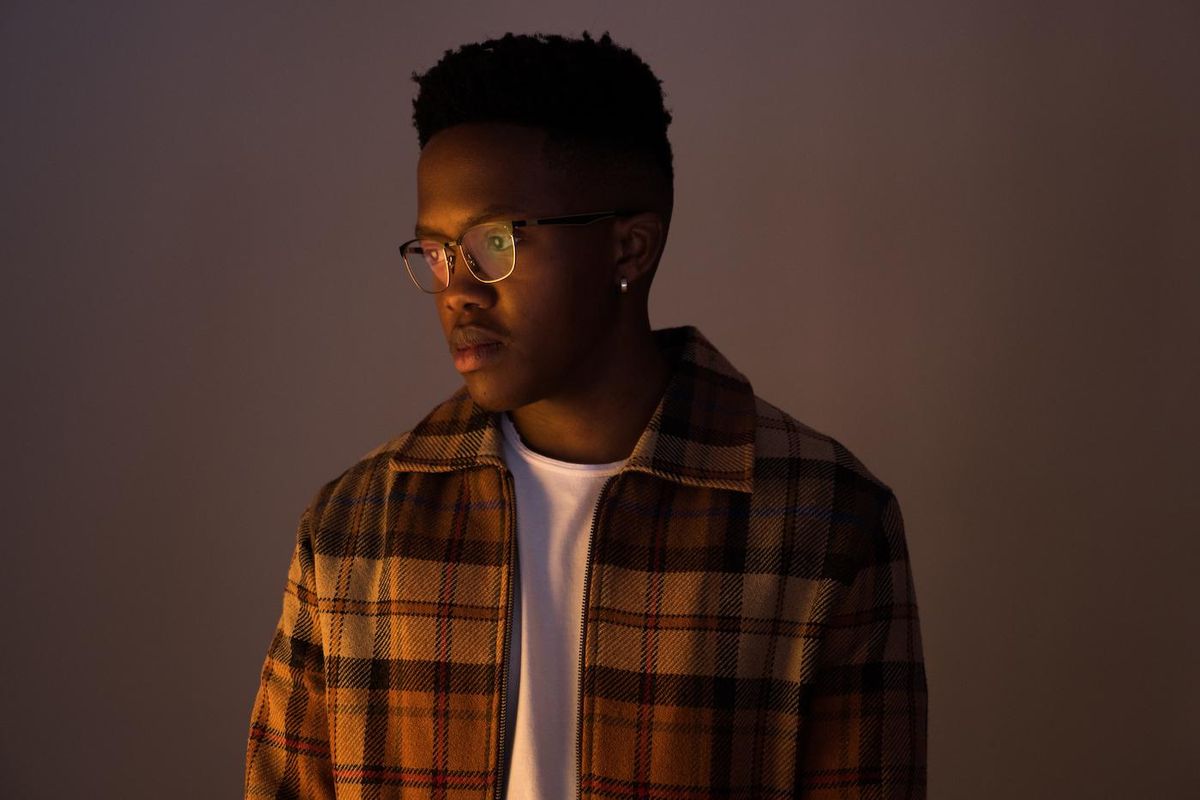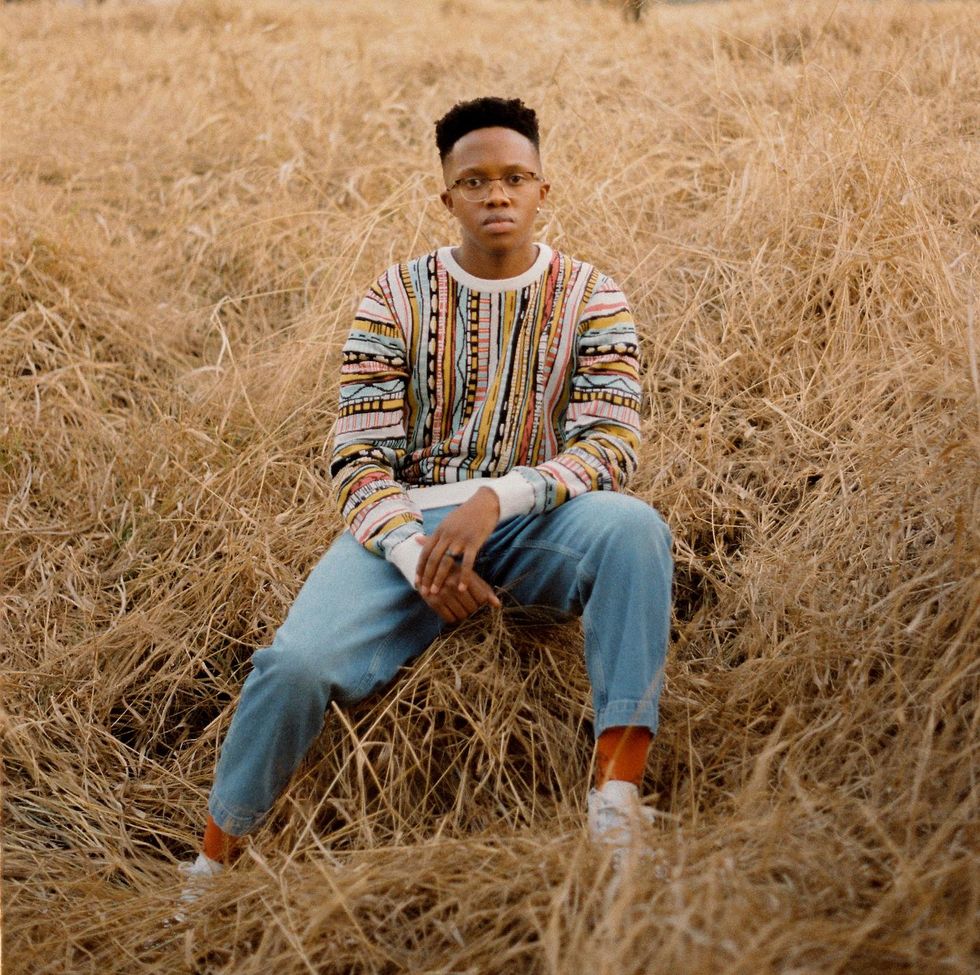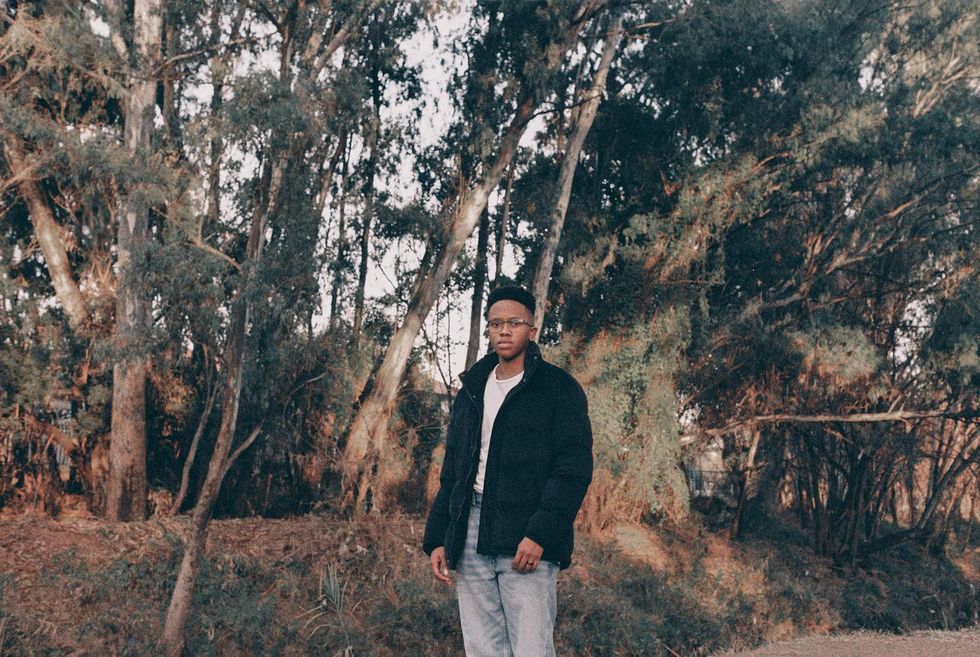Interview: In The Beginning Was Manana
Manana on his debut album 'In The Beginning Was The End', a relatable love story narrated backwards.

Ndumiso Manana had just purchased a microphone to complete his home studio setup when President Cyril Ramaphosa announced a hard lockdown in 2020.
Unable to tour with his Seba Kaapstad family due to travel restrictions implemented as part of measures to curb the spread of the novel Coronavirus, SARS-CoV-2, he did what many musicians in his circles, and around the world, were doing: he diverted his attention to something else.
In his case, the diversion led to one of 2020's most beguiling releases, In The Beginning Was The End, an album so perfect, so polished yet raw; so whole yet sparse; so sophisticated yet, strangely, relatable.
"For the last two years, before releasing this project, other than releasing singles, I've been writing for other people and writing for other people's albums. I don't really limit myself to what genre I like to work in, I enjoy so much, so why not get involved in a lot of it?" says Manana.
Man of many moments
Manana, who was chosen by Apple Music as their South African artist of the month for January, has been grinding hard. He's built momentum with singles such as the sanguine indie-soul cut, "You Don't", and the ominous-sounding "Electricity"; and he's released three albums with the Seba Kaapstad quartet, of which Zoë Modiga is a member.
Everything about Manana's career up to this point is a by-product of intention and a side portion of luck. Before going solo, he was focused on "interrogating how to make music that resonates with people." Fame, however we understand it in 2021, was not part of the vision. But when the streaming figures kept climbing, in part due to people with stable Internet access being stuck inside all the time, Manana took it as an indicator that what he'd been ploughing had blossomed.
Read: Rowlene Grapples With Romantic Nonchalance and the Yearning for True Love in Her Debut Album '11:11'
"In a perfect world, you'd be able to release and then tour the music. But we released the songs, and a few months later, the country opened up just a little bit, so we were able to have some small, intimate shows. It ended up working really well. A lot of people were able to hear the sound, a lot of new people were also introduced to the music," he says.
On the road
I take the opportunity to ask that he speak about life on the road, drawing on past touring experiences.
"Travelling with the Seba Kaapstad crew has opened me up to a different way of seeing music. The way that we appreciate music and culture is different from the way that [Europeans] do. I feel a little nervous to be a headliner of a festival, for example, but that's something we've been doing quite a lot in the last four years."

Overall, Europeans are open, but need instructions, he says. It's a bit different in The Muthaland. We scream, "iyowee", we vlyt, "tjovitjo", we vosho to sghubu and slow jams with equal conviction. We are a vibe.
"You don't have to tell people. They sing every note, they sing every line. They dance when they wanna dance. It's a completely different thing, it's a raucous. People feel like they're part of the show, not 'it's me giving you a show'," he says. "Both sides have their positives and negatives; performing here is beautiful because of the warmth and the love, and performing over there is beautiful because of their attentiveness. People don't miss a word, they don't miss a line, they don't miss anything."
The best performance he's ever seen?
"The best performance I've ever witnessed in my entire life, with no comparison, was Hugh Masekela. I got to watch one of his last shows at Bushfire in Swaziland. That same year, TKZee had performed the night before. And he came on, and the way he captivated the audience…to see him commanding a stage. Big personality, also playing the trumpet, the spoken word; he had the audience from minute one, 'til minute last. When I look at performance, I look at doing what he did that day—to capture an audience with what you're saying, with the music you're making, with the arrangements in the music as well."
Read: Seba Kaapstad Is the Genre-Bending South African Jazz Band Spreading a Message of Optimism
Love in reverse
In The Beginning Was The End is a love story narrated backwards. The cover image finds Manana glancing awkwardly toward the camera while the light source illuminates the right hand side of his face. The square-shaped eyewear he spots hints at one wise beyond years; it's as if he's about to pull out a thesis detailing his peer-reviewed research on the trappings of love.
It's until one pays attention to that gold earring on his left ear, coupled with the Boyz-II-Men-style high top fade, that it becomes apparent that this man's here to wax lyrical about his lived experience, not to spit academic hogwash about what to do with the injury you incur after having fallen in love.
On the album opener "Call Me", Manana genuflects at the altar of a fading love:
"Why you always seem unpleasant?/ You won't tell me, but you tell your friends and/ they want it to end, don't even pretend," he wonders.
"Call Me", "Heartbreak on a Summer's Day", "Sunday Morning" (with Rowlene), are sombre in their subject matter. The reassuring "If You Are Here..." diffuses the tension. It feels like the moment one finds their feet in love:
"I know that I've been wasting/ time and money, trying to go different places/ [...]/ all this time, there's one thing that I know/ if you're here, there is nowhere I need to go," he admits.
"That's the love part of the EP," he says. "I'd like to say it was premeditated, but I'm not that smart. It kind of happened. After the first three songs, we were like 'actually, this is a dope love story'. That's why a lot of the songs also flow into each other; there's no real stop and start."
A noble servant among kings
Manana, along with Bubele Booi and David Balshaw of the production duo Noble produced the majority of the album.
Their relationship goes back to the formative South African College of Music days.
Manana tells the story: "Bubele was starting a project, and he wondered if I was keen to join him. We worked a bit on a few songs, and we really liked [the process]. Another artist heard one of our songs and asked if we could write for them, and we did that. When it came to making my music, it just kind of made sense."
Noble is profiled on a Next Gen Greats podcast episode. They share golden keys to their production process, and speak affectionately about working on the EP with Manana.
"What excites us is being able to go on a journey with an artist, and try and understand who they are, and what story they're trying to tell. And how, with our skillset and with what we're able to do, can we bring that to life. That involves creating a sonic world, and then finding people, with the artist, to create a visual world to tell that story," says David.

Bubele's thoughts about building a sonic world offer an understanding of how the music adds layers to Manana's songwriting and vocal prowess. "Building the world together is so much more fun because you can misstep, you can go another direction and say, 'that's not what we want, let's try this.' You can experiment. It's more of a collaborative process than producing just a song," says Bubele.
Says David: "We were in a creative space that was able to tell Manana's story in a way that we weren't intentionally trying to do, but when we put all the songs together, and we figured out the order of the story that was trying to be told, it felt cohesive; it felt like a world that was special to Manana, and that felt coherent, and that felt true to us as producers, and it's something that we're very proud of."
"It wasn't difficult to find out where to go with this because Manana sets the tone, and we follow. That's the sign of an incredible artist," adds Bubele.
"We like working together simply because we have different strengths. I write chordally, so when I'm sitting and writing, I usually start at the piano. That can usually start the production, and start the song, and then we can start penning down some ideas," says Manana.
"The chords that I use on my EP with the song 'Euphoria', I would never have ever touched without my jazz training. Those are chords that, when I spoke to people they were like 'what key is this?', I'm like, it's not really a key. And that's a typical jazz answer. They're just chords, they're just beautiful chords."
With this, he brings to mind a YouTube clip of the great composer, sonic revolutionary and bandleader Duke Ellington.
"Where did you get your ideas from?" the reporter inquires off-camera.
"The ideas?" Mr. Ellington asks. "Oh man, I've got a million dreams. That's all I do, is dream. All the time," comes the answer.
"I heard you play piano," says the reporter.
"Nah, this is not piano, this is dreaming," says Ellington, instantly turning towards the piano to let out them beautiful chords.
Memories of Tagore's
The more we speak more about Manana's Cape Town days, the more I recall that things have been bad for a mighty long time on the live music circuit front; that many important music venues in Durban, Cape Town, Joburg, and smaller locales have had to close doors over the years. COVID-19 exacerbated endemic music industry problems, it didn't create new ones.
To wind our conversation down, I ask him about the long-closed-down hole-in-the-wall, Tagore's. Located just off Lower Main Road in Observatory, 42 Trill Road became a crucial address where the scattered music community gathered in Cape Town.
"I think Tagore's is the first truly free music space that a lot of us at the University of Cape Town experienced. You were learning things at college, and you kind of felt intimidated by that space to perform because a lot of the people that were older than you were really good, and you didn't feel like you were good enough. Whereas at Tagore's, it was this space where people really just wanted to listen to some music. You could work out, and try yourself out a little bit."
Stream In The Beginning Was The End on Apple Music and Spotify.
Follow Manana on Twitter and Instagram.
- In Conversation with Mzwandile Sibanda: 'We wanted to provide ... ›
- J Molley “Ang'na Stress” (featuring Costa Titch and Yanga Chief ... ›
- The 16 Best South African Songs of the Month (September ... ›
- Listen to Langa Mavuso's Debut Album 'LANGA' - OkayAfrica ›
- Langa Mavuso's 'LANGA' Captures the Beginning, Middle & End of ... ›
- Seba Kaapstad Is the Genre-Bending South African Jazz Band ... ›
- Rowlene Grapples With Romantic Nonchalance and the Yearning ... ›
- Rowlene Shares New Single 'Stop' from Upcoming Project '11:11 ... ›
- Cape Town Neo Soul Group Seba Kaapstad Just Signed to Mello ... ›
- Manana Named Apple Music's New Artist Spotlight for January ... ›

